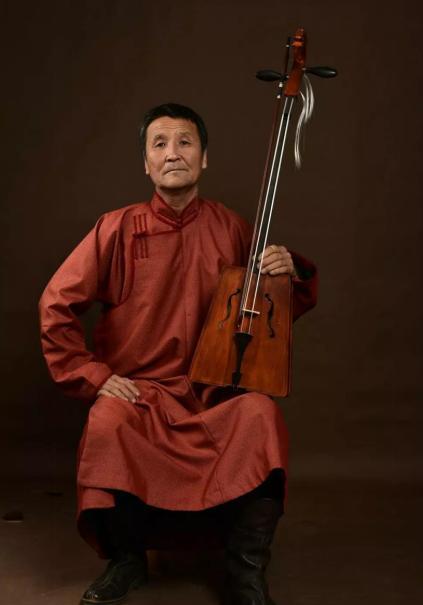Northern Xinjiang craftsman Matouqin maker Wu Liji: "Qin" at first sight in 40 years
Digging and polishing the sound box panel, carving the horse's head on the stem... After dozens of purely manual processes, Wu Liji carefully served the newly-made horse-head qin with his calloused hands, like stroking his favorite. children.
At the opening ceremony of the 2008 Beijing Olympic Games, the matouqin used by the Mustang Matouqin troupe of Qi Baoligao, a national first-class performer and world matouqin master, was produced by Wuliji. He also became the only national musical instrument maker in Inner Mongolia who used the trademark privilege of "Qi·Boligao". Since 1978, he has been learning to make matouqin, and he has never put down the carving knife in his hand. This grip is 41 years.

The hard way to learn piano
Matouqin, Mongolian called "Molin Huer". In 2006, Mongolian matouqin music was included in the first batch of national intangible cultural heritage list. In 2011, "the production process of Mongolian stringed musical instruments" (including the production of matouqin) was included in the third batch of national intangible cultural heritage list. Wuliji is such an inheritor of the matouqin production skills of the autonomous region-level intangible cultural heritage project.
In 1978, 19-year-old Uliji found out that his neighbor, Rashidrig, who was a carpenter, could make matouqin. He immediately took a teacher and began to learn how to make Mongolian stringed instruments. In the following decades of work, he worked hard to learn a variety of theoretical and practical knowledge, without a moment's slack.
Fate is wonderful. When Wu Liji was carrying his qin to sell to various matouqin training classes, he met Qi Baoligao. After Qi Baoligao tried the matouqin made by Wu Liji, he was full of praise: "Young man, your matouqin is very well done, you are very talented."
Recognized and praised by the world's matouqin masters, Wu Liji was injected with a booster. "The thickness of the panel, the angle of the sound box, the position of the piano rod, etc., Mr. Qi Baoligao also taught me some detailed parameters of matouqin production." After the master's guidance, his piano-making skills have jumped to a new level .
In 2005, after repeated failures, Wuliji finally succeeded in developing the first digging board matouqin within the Inner Mongolia Autonomous Region, and named it "Huluge digging board matouqin".
Perseverance and persistence in ingenuity
"The manual production cycle is too long and the output is small. I have always suggested that my father use a machine to make the piano, but he firmly disagrees." Uliji's son Naren Mandula said.
Wuliji has always insisted on hand-made matouqin. "Each piece of wood has its own characteristics. If it is machined and polished, it will destroy the pores of the wood itself, affect the vibration of the wood itself, and thus affect the sound of the piano. Only by hand polishing, can the characteristics of the wood be guaranteed to the greatest extent and present The perfect sound."
From material selection, cutting, molding, engraving, assembling, polishing, to tuning, painting, etc., Wuliji has done dozens of procedures himself, so the sound of each piano is unique.
"It's been a year since the qin that is being made now." Wu Liji said, this qin is a matouqin custom-made for Qingle, chief executive of the National Orchestra of Inner Mongolia National Art Theater, in order to achieve the best oxidation of the panel. The effect has been stored and polished for a year. During this period, it is also sent to the cabaret theater to "listen" to the performance, so that the wood "absorbs" the music.
In addition to his superb craftsmanship, Wu Liji also has a pair of magical ears - he can remember the characteristics of the sound of the piano he has ever heard; just by listening to the sound, he can identify the piano, and he can also hear the fault of the piano.
"The faster the world, the slower the heart"
"Strictly require students and apprentices from every detail of production, so that they can strengthen their beliefs and concentrate on doing things. 'The faster the world is, the slower the heart is'." Since accepting apprentices in 1997, Wu Liji has trained 58 students. students.
In the daily production process, he always reminded the students that life needs vitality, life needs vitality, and national culture needs vitality even more. If the national culture is to be dynamic, it must be "connected". To be a "passenger" first, which means that the production technology must be excellent, and the details must be meticulous, and then to be a "talent".
"There is life in every piece of wood I need, and I must listen to the voice of life when I work. The results of my work must stand the test of time. I think that only those who work hard and work hard can realize the value of work. Fun," Uliji said.
In his 41-year career in piano making, he hopes to impart the most precious craftsmanship spirit to more young people, telling them that the meaning of work is not only to pursue performance, but also to improve people's hearts.
Returning to the society and contributing to the nation's music career is Wu Liji's indelible dream, and maintaining the "artisan spirit" has also become his eternal belief.
 渝公网安备 50010702504639号
渝公网安备 50010702504639号